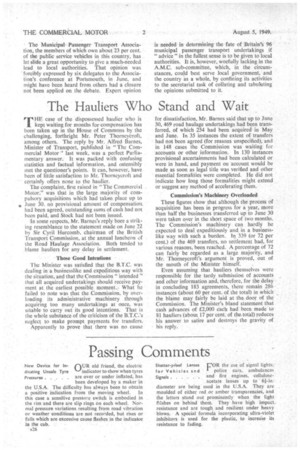The Hauliers Who Stand and Wait
Page 28

If you've noticed an error in this article please click here to report it so we can fix it.
THE case of the dispossessed haulier who is kept waiting for months for-compensation has been taken up in the House of Commons by the challenging, forthright Mr. Peter Thorneyeroft, among others. The reply by Mr. Alfred Barnes, Minister of Transport, published in "The Commercial Motor last week, was a perfect Parliamentary answer. It was packed with confusing statistics and factual information, and ostensibly met the questioner's points. It can, however, have been of little satisfaction to Mr. Thorneycroft and certainly offers n.one to the haulier.
The complaint, first raised in "The Commercial Motor," was that in the large majority of compulsory acquisitions which had taken place up to , June 30. no provisional amount of compensation. had been agreed, outstanding sums of cash had not been paid, and Stock had not been issued.
In some respects, Mr. Barnes's reply bore a striking resemblance to the statement made on June 22 by Sir Cyril Hurcomb, chairman of the British Transport Commission, at the annual luncheon of the Road Haulage Association. Both tended to blame hauliers for any delay in settlement.
Those Good Intentions The Minister was satisfied that the B.T.C. was dealing in a businesslike and expeditious way with the situation, and that the Commission " intended " that all acquired undertakings should receive payment at the earliest possible moment. What he failed to note was that the Commission, by overloading its administrative machinery through acquiring too many undertakings at once, was unable to carry out its good intentions. That is the whole substance of the criticism of the B.T.C.'s neglect to make prompt payments for transfers.
Apparently to prove that there was no cause for dissatisfaction, Mr. Barnes said that up to June 30, 469 road haulage undertakings had been transferred, of which 254 had been acquired in May and June. In 35 instances the extent of transfers had not been agreed (for reasons unspecified), and in 148 cases the Commission was waiting for accounts or other information. In 130 instances provisional ascertainments had been calculated or were in hand, and payment on 'account would be made as soon as legal title was verified and other • essential formalities were completed. He did not indicate how long those formalities might extend or suggest any method of accelerating them.
Commission's Machinery Overloaded These figures show that although the process of acquisition has been in progress for a year, more than half the businesses transferred up to June 30 were taken over in the short space of two months. The Commission's machinery, can hardly be expected to deal expeditiously and._ in a businesslike way with such a burden. In 339 (or 72 per cent.) of the 469 transfers, no settlement had, for various reasons, been reached. A percentage of 72 can fairly be regarded as a large majority, and Mr. Thorneycroft's argument is proved, out of the mouth of the Minister himself. , Even assuming that hauliers themselves were responsible for the tardy submission of accounts and other information and, therefore, for the delay in concluding 183 agreements, there remain 286 instances (about 60 per cent. of the total) in which the blame may fairly be laid at the. door of the Commission. The Minister's bland statement that cash advances of £2,000 each had been made to 81 hauliers (about 17 per cent of the-total) reduces his answer to satire and destroys the gravity of his reply.
























































































